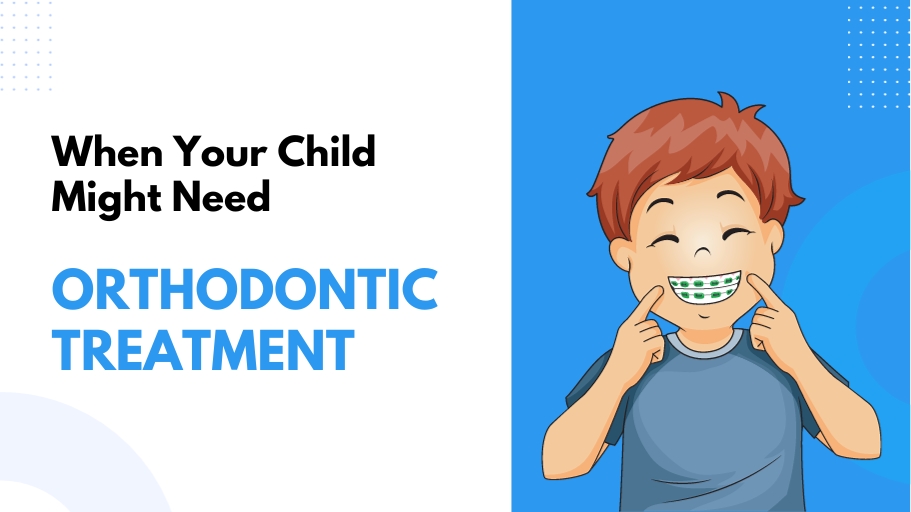Is it Time for Braces? Understanding When Your Child Might Need Orthodontic Treatment
This post was last updated on November 12th, 2024

Do you notice your child’s teeth are coming together oddly, or that they’ve grown into a crooked smile? It might be time to consider orthodontic treatment. Orthodontics is the branch of dentistry concerned with correcting irregularities in teeth and jaws. While many parents worry about their children needing braces, early intervention can help ensure better oral health and a beautiful smile in the future.
In this article, we’ll discuss the signs and symptoms that your child may need orthodontic treatment, and how to find the right professional for their care.
Signs of Orthodontic Treatment
The American Association of Orthodontists (AAO) recommends a check-up with an orthodontist no later than age 7. By this age, your child’s teeth should be set in their permanent positions and the orthodontist can make an assessment.
If you’re noticing any of the following signs in your child, it may be a good idea to schedule a visit to a children’s dentist:
- Difficulty eating or talking
- Teeth that are crowded together or have gaps between them
- Teeth that stick out at an angle
- Misalignment of the jaw
- Lower lip stuck out when smiling
- Early or late loss of baby teeth
If your child is experiencing any of the above symptoms, it’s time to make an appointment. An experienced children’s dentist in Layton will be able to assess their condition and determine if they need braces or other orthodontic treatment.
Choosing an Orthodontist
When selecting an orthodontist for your child, it’s important to choose one who has experience in treating children. Look for a dentist who is certified by the American Board of Orthodontics (ABO), as this certification ensures that the dentist has met rigorous standards in orthodontic care.
When you schedule a visit, ask questions about their experience and approach to treatment. You should also inquire about payment plans and insurance coverage if this is a concern for your family. Finally, take into account your comfort level when selecting an orthodontist – it’s important to find someone who you and your child feel comfortable with.
Once you’ve chosen an orthodontist, they will do a full examination of your child’s mouth and suggest treatment options if necessary. Orthodontic treatment can vary greatly depending on the individual’s needs, so it’s important to discuss the details with your dentist before proceeding. Treatment may include braces or other orthodontic appliances, such as aligners or palatal expanders.
Benefits of Early Orthodontic Treatment
Early treatment can help your child avoid long-term damage to their teeth and jaw. It can also reduce the need for more extensive corrective measures in the future, as it can address problems before they become too severe. Early intervention is often less expensive than later treatments, as well.
Orthodontic treatment can also improve your child’s self-confidence. A straight, healthy smile is attractive and can help them feel good about their appearance. It can also improve their overall oral health by making it easier to brush and floss properly.
Your child’s orthodontic treatment should be tailored to their needs, so it’s important to speak with an experienced dental professional who can assess your child’s condition and recommend the best course of action. With the right care and support, your child can have a beautiful, healthy smile for years to come.
Questions to Ask Your Child’s Orthodontist
It’s natural to have questions about your child’s orthodontic treatment. To ensure that you are comfortable with the plan of care, here are some important questions to ask:
- What is the estimated length of treatment?
- What type of braces or other appliances will be used?
- Will my child need any additional treatments during their orthodontic visit?
- Are there any dietary restrictions while in braces?
- How often will my child need to come in for adjustments?
- What type of care and maintenance is needed after the braces are removed?
By asking these questions, you can be sure that your child is receiving the best treatment possible. Understanding the plan of care will help you and your child feel more confident about their orthodontic journey.
Now that you have a better understanding of when your child may need orthodontic treatment, you can make an informed decision about their care.
Recommended For You
How to Start a Healthier Lifestyle and Look Younger
Most Inside
Most Inside offers high-quality recommendations and valuable updates to enhance all aspects of your life, providing premium guidance and enriching experiences.




